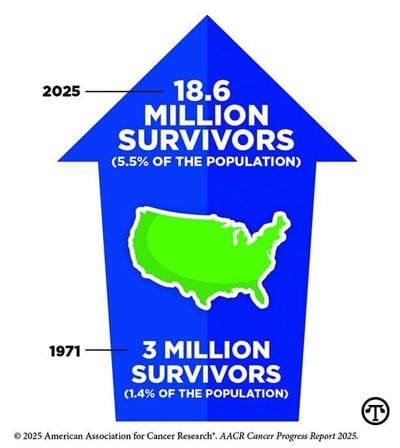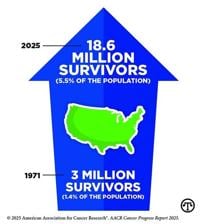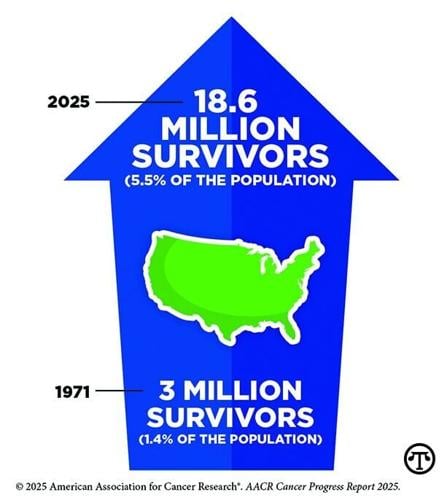(NAPSI)—Good news: According to a recent report from the American Association for Cancer Research (AACR), discoveries across basic, translational, and clinical research as well as population sciences are driving advances in cancer medicine and early detection, leading to a steady decline in the overall U.S. cancer death rate, and allowing more people to live longer and fuller lives after a cancer diagnosis.
From the AACR Cancer Progress Report 2025, here’s a look at some recent breakthroughs.
Between July 1, 2024 and June 30, 2025, the U.S. Food and Drug Administration (FDA) approved 20 new anticancer therapeutics, including:
•the first T-cell receptor (TCR) T-cell therapy, approved for patients with soft tissue sarcoma;
•a new therapeutic antibody targeting a novel protein on stomach cancer cells, which helps those with gastric or gastroesophageal cancer;
•the first IDH-targeted therapy for treating brain tumors, which is bringing new hope to young adult patients who have a mutation in this gene; and
•two new antibody-drug conjugates, both of which were approved to treat lung cancer and one that was also approved to treat breast cancer.
At the same time, FDA also approved:
•new uses for eight previously approved anticancer therapeutics;
•a wearable device that uses low-intensity electrical fields to slow the growth of lung cancer cells;
•two new minimally invasive early detection screening tests, including the first liquid biopsy test and a next-generation multitarget stool DNA test for colorectal cancer screening;
•a device for at-home sample collection for cervical cancer screening; and
•several AI-powered devices and software tools for aiding in cancer risk prediction, diagnosis, and early detection.
Survival Statistics: Due to a reduction in smoking rates as well as advances in prevention, early detection, and treatment, the age-adjusted overall cancer death rate in the United States fell by 34% between 1991 and 2023, a reduction that translates into averting more than 4.5 million deaths from cancer.
What’s more, the five-year relative survival rate for all cancers combined has increased from 49% for those diagnosed between 1975 and 1977 to 70% among those diagnosed between 2015 and 2021.
As a result, there are more than 18.6 million adults and children with a history of cancer living in the United States, representing 5.5% of the total U.S. population.
The AACR’s annual Cancer Progress Report is a cornerstone of the organization’s educational and advocacy efforts. This comprehensive report provides the latest statistics on cancer incidence, mortality, and survivorship and highlights how federal investments in basic, translational, and clinical cancer research and cancer-related population sciences have led to impressive scientific advances that are improving health and saving lives.
The Challenge: The report also highlights how progress is now in jeopardy due to prolonged funding uncertainty and political interference that are weakening cancer research, undermining scientific integrity, and eroding the infrastructure that turns discovery into lifesaving patient care.
The Call to Action
To help address the funding challenges facing cancer research, the report issues a strong, timely call to action urging policymakers to stand up in support of the National Institutes of Health (NIH), the National Cancer Institute (NCI), FDA, and the Centers for Disease Control and Prevention (CDC), and to provide a robust funding increase for cancer research in Fiscal Year (FY) 2026.
Learn More
For further facts and to read the report, visit CancerProgessReport.org.
Word Count: 534




(0) comments
Welcome to the discussion.
Log In
Keep it Clean. Please avoid obscene, vulgar, lewd, racist or sexually-oriented language.
PLEASE TURN OFF YOUR CAPS LOCK.
Don't Threaten. Threats of harming another person will not be tolerated.
Be Truthful. Don't knowingly lie about anyone or anything.
Be Nice. No racism, sexism or any sort of -ism that is degrading to another person.
Be Proactive. Use the 'Report' link on each comment to let us know of abusive posts.
Share with Us. We'd love to hear eyewitness accounts, the history behind an article.